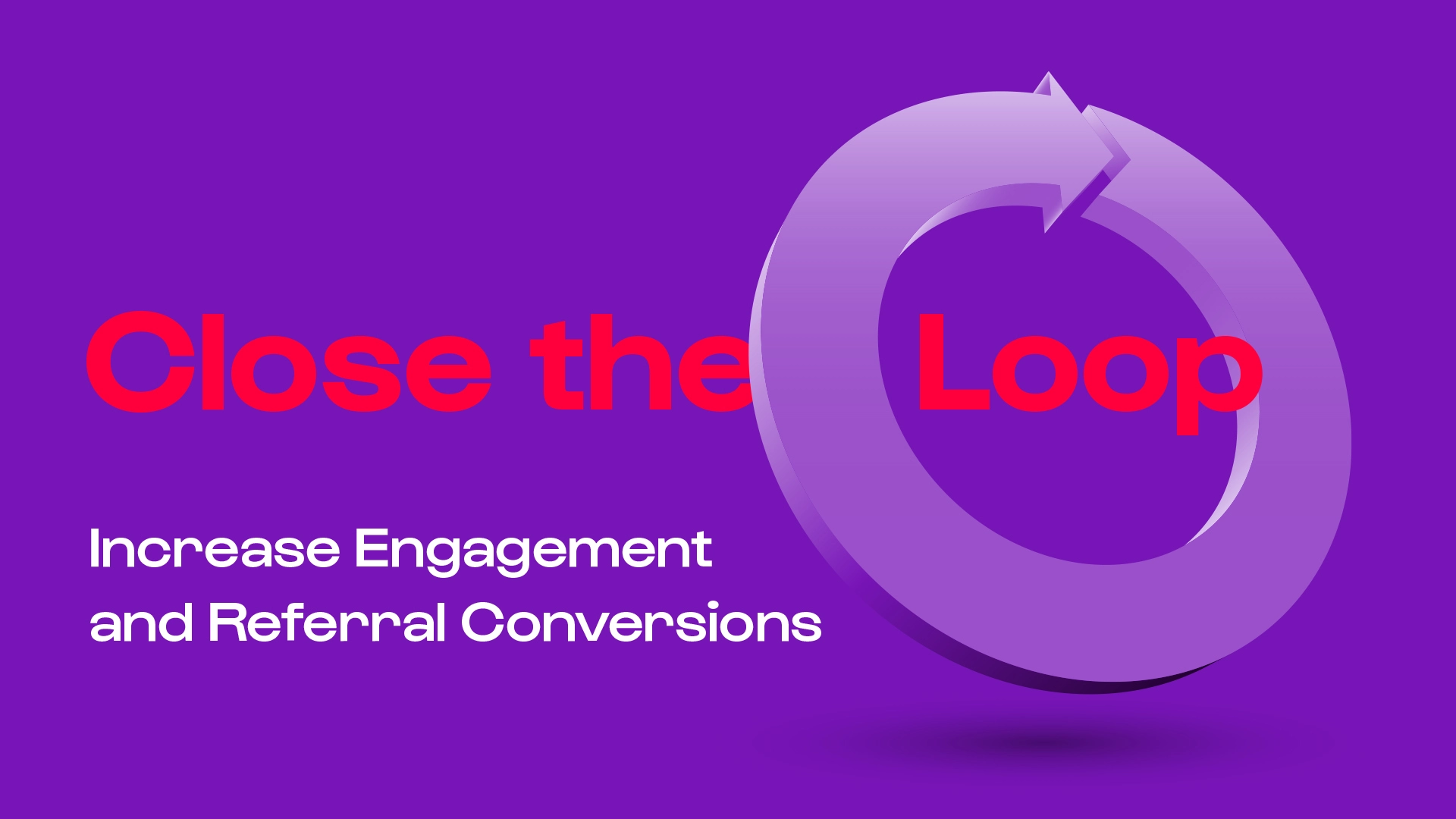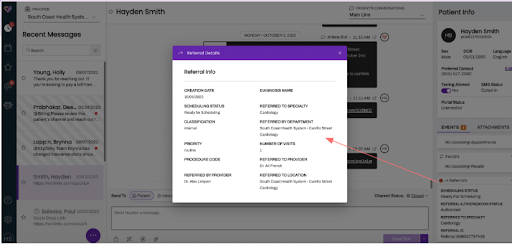
The referral process is a critical piece of the patient journey; it ensures that patients receive the highest level of care necessary for disease prevention, diagnosis and effective treatment. Despite their importance, industry metrics indicate that up to 50% of patients never make that referral appointment, and alarming new data in The Journal of the American Medical Association indicates that those metrics may even be higher for patients who receive a referral during a telemedicine appointment.
Importance of the Referral System
Researchers found that when adjusting for factors like social demographics, location, health conditions and more, the rate of follow-through or “closing the loop” remained surprisingly low and even lower for telehealth. The low percentages for telehealth are particularly concerning as it has become widely used and accepted since the initial COVID-19 outbreak and remains very popular in rural communities that otherwise do not have access to certain specialists.
The Referral Process
The referral process is not linear; it is one filled with multiple steps and barriers. Generally, a primary care physician (although referrals, especially for radiology, often come from other specialties as well) must first indicate the need to see another physician. The patient must then actively make an appointment with the suggested referring physician or do their research to find a physician or imaging center. Then, medical records and imaging must be transferred. And finally, insurance must approve the referring physician and further treatments.
What negative outcomes can a lost referral have for patients and facilities alike? And, how do we improve the process?
Lost Referrals are Dangerous for Patients and Facilities
Ignoring a referral can have serious consequences for a patient. They may miss an early diagnosis through preventative care, lose access to effective treatment, and ultimately, have a worse outcome. Studies have demonstrated a considerable decline in cancer deaths over the last 20 years thanks to preventative screenings, highlighting their importance to the long-term health of patients.
Lost referrals can also negatively impact a hospital’s bottom line with health systems losing 55 to 65 percent of revenue as a result of referral leakage. Additionally, failure to appropriately hand off a patient contributes to about 20% of errors in medical settings leading to malpractice suits.
Physicians and facilities must stay on top of referral management processes to ensure that patients do not slip through the cracks of our complex healthcare system.
Closing the Loop – Why Aren’t Patients Making that Referral Appointment
Patients can have many reasons for not following through with a referral. Sometimes these reasons are simple like a non-urgent complaint going away on its own. However, a communication breakdown is a core challenge. Communication is key when it comes to:
- Explaining why they need to see another physician – some patients are confused and don’t understand why their primary care doctor can’t handle everything.
- Educating patients on the importance of preventative exams to their long-term health.
- Understanding how certain socioeconomic barriers might make a patient fear pursuing a referral (these can range from financial worries to cultural attitudes towards the healthcare system). Language barriers can also cause a fear of the dreaded healthcare system phone tree line.
- Providing the right tools streamline patient scheduling (without adding more work for already burned-out staff).
- And finally, simply helping very busy patients make the time to schedule. A recent study1 found that for younger individuals, being “too busy” and making the time to schedule the appointment is a top factor in their appointment delay.
For example, the authors of the telehealth study noted that a reason for the lack of follow-up might be that when leaving a doctor’s office in person, a receptionist may ask you to make a follow-up appointment and may even offer a list of referring physicians. This simple reminder and personal touch might get lost in the telemedicine journey.
Facilities need to develop effective patient communication plans and education to boost referrals. A key to the puzzle is providing the right tools to patients that will streamline the referral process and encourage them to take the next step. The results can be enormous, with one enterprise provider generating an estimated $1.9M in revenue just after 60 days of implementing Artera to act as a referral communications tool. Another enterprise healthcare provider in the northeast leveraged Artera to launch a population health campaign which enabled patients to quickly and easily schedule their next mammography appointment. Over 7,000 appointments were scheduled with 140 cases of cancer found.
New Referrals Tools
UNC Health (UNCH) is a large health system across North Carolina with over 5000 healthcare providers. They had been using their EHR for appointment reminders, referral outreach, and more digital communications, however, the vendor did not provide the core functionalities they were looking for, like the ability to text with patients. Texting is critical to most patients today – Artera’s Trends in Patient Communications report highlights that almost all patients expect basic texting at the very least, and over 70% prefer more conversational messaging.

UNCH had begun receiving a high volume of referrals due to business expansion but without the right technology in place, their busy staff could simply not schedule the appointments promptly. The referral conversion rate (defined as the ability to receive a referral order and convert it into a scheduled appointment) was only averaging 30% per month.
The rheumatology department then implemented Artera to assist with referral conversions. With Artera conversational messaging, UNCH was able to text its patients about setting up a referral appointment, and patients could instantly text or call back. The conversion rate skyrocketed to over 70% per month.
“Artera has set us apart. Our ability to communicate to patients in their preferred method is huge. It really makes a difference.”
Velaire Elliot, Healthcare System Manager of Access and Clinical Integration
Improving Staff Workflows – Closing the Loops
While patients respond best to frequent communications, the very staff sending those frequent communications and making phone calls is often burned out and overwhelmed (Artera’s Staff Burnout Study indicates that over 70% of clinical staff feel moderately to severely burned out). Many are concerned that new tools and workflows will only make things more complicated and increase fatigue.
At UNCH, however, staff began to consistently experience a decrease in the number of incoming phone calls after Artera was implemented. Elliott said, “A decrease in phone calls is really important from a staff perspective because they say, ‘That makes a difference in my day-to-day work. If I’m answering 1,000 or 2,000 fewer phone calls every month, that makes a huge difference.’”

Using Artera, referrals are conveniently displayed on the Patient face sheet, allowing support staff to access referral details from the EMR, including the referred department or specialty, simplifying patient scheduling. Support staff can easily filter and manage referral-related messages, ensuring efficient handling of patient referrals.
Automated Referral Management Processes
Artera also reduces the need to manually call patients to book referrals by automating the outreach for referrals. When a new referral record is created, it gets information from EHR systems using the HL7 REF standard. Predefined follow-ups encourage patient responses, and a writeback of the information helps providers meet their three reminder obligations. Patient communication preferences, including their preferred language and channel, are used to boost their engagement.
Elliott sums it up, “Artera sets us apart, especially in the Research Triangle where we have multiple world-class healthcare systems. Our ability to directly communicate with patients in their preferred method is huge. It really makes a difference.”
Ready to boost health care referrals at your facility? Learn more about Artera Referrals.


